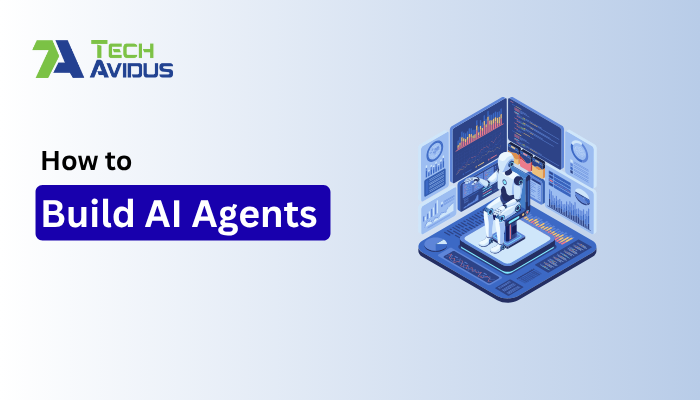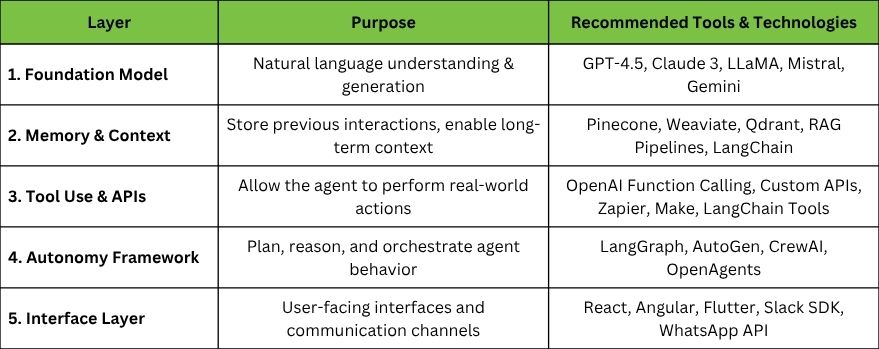
Artificial Intelligence has swiftly moved from being a futuristic buzzword to a critical business necessity. From streamlining internal workflows to delivering intelligent customer interactions, AI agents are now driving digital transformation across industries.
At TechAvidus, one of the most common questions we hear is: "How do we build an AI agent that can scale with our business?" It’s an important—and increasingly complex—question.
As we move into 2025, building AI agents isn’t just about connecting to a GPT API. It’s about creating smart, autonomous systems that can reason, act, adapt, and scale in real-world environments.
In this article, we’ll walk you through the key strategy, technology stack, and best practices needed to build AI agents that not only work—but grow with your organization.
Unlike traditional chatbots or RPA tools, modern AI agents are dynamic, decision-making systems that can:
Imagine an AI-powered logistics coordinator that tracks orders, communicates with vendors, handles exceptions, and generates real-time reports. Or a financial AI assistant that reconciles transactions, extracts insights, and delivers compliance-ready documentation.
That’s the kind of maturity businesses now expect—and it's fully achievable in 2025.
Before selecting tools or frameworks, clarify the role and purpose of the AI agent:
Ask yourself:
Whether you're building a virtual onboarding assistant or an automated financial analyst, defining the agent’s role will shape your architectural and technical decisions.
Here’s a modular, scalable tech stack we recommend for building modern AI agents:

Once your use case is defined and the stack is in place, follow a phased development process:
🔹 Step 1: Prototype with an LLM
Start with a model like GPT-4.5 or Claude 3 to simulate basic interactions and fine-tune your prompt strategies.
🔹 Step 2: Add Memory
Integrate vector databases to enable long-term memory and personalized responses.
🔹 Step 3: Connect Tools & APIs
Empower your agent to take real actions—fetch data, send emails, update records, or integrate with SaaS tools.
🔹 Step 4: Implement Autonomy
Use orchestration frameworks to guide the agent through workflows, multi-step tasks, and decision-making logic.
🔹 Step 5: Monitor, Optimize & Iterate
Track performance, introduce human-in-the-loop feedback, and continuously refine the agent using logs and analytics.
With great capabilities come serious responsibilities. Keep the following in check:
One agent can solve one problem. A team of agents can revolutionize workflows.
Use orchestration frameworks to deploy multiple agents (finance, HR, research, customer support) that collaborate just like departments in a company. These multi-agent ecosystems unlock compounding value—especially when designed with shared memory, secure communication, and feedback loops.
In 2025, knowing how to build an AI agent is no longer just a developer’s task—it’s a strategic business function. Success hinges on:
Ready to Build Your AI Agent?
At TechAvidus, we help businesses build scalable, secure, and high-performing AI agents—customized to their industry, workflow, and vision.
Let us help you define, develop, and deploy your next-generation AI solution. Contact us today to get started.
1. What is the difference between an AI agent and a chatbot?
A chatbot follows a predefined script. An AI agent can make autonomous decisions, access tools, interact with data, and adapt over time.
2. Can non-technical teams build AI agents?
Yes, with the rise of low-code/no-code tools, even non-technical teams can prototype agents. However, production-grade agents often need developer involvement.
3. Which model is best to use when building AI agents?
GPT-4.5, Claude 3, LLaMA 3, and Gemini are all strong options, depending on your budget, accuracy requirements, and deployment environment.
4. Are multi-agent systems just a trend or a real solution?
Multi-agent systems are already being adopted in enterprise automation. They mirror real organizational structures and scale more effectively.
5. What industries benefit most from AI agents?
AI agents are transforming industries like customer service, finance, healthcare, eCommerce, logistics, HR, and SaaS by automating workflows and enhancing decision-making.
6. How secure are AI agents?
Security depends on your implementation. You must follow best practices: encrypt data, validate inputs/outputs, enforce access controls, and audit the agent’s actions—especially when it has real-world tool access.

Bhavesh Ladva is a seasoned AI Developer with over 10 years of experience in machine learning, deep learning, and NLP. He has built scalable AI solutions across industries, leveraging technologies like Python, TensorFlow, and cloud platforms. Bhavesh is passionate about ethical AI and constantly explores innovative ways to solve real-world problems.
Our Top 1% Tech Talent integrates cutting-edge AI technologies to craft intelligent, scalable, and future-ready solutions.
All Rights Reserved. Copyright © 2025 | TechAvidus